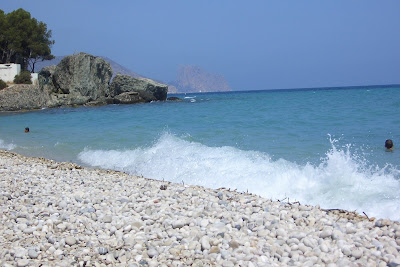A life on the ocean wave is fine for those with sea-legs inside their sea-boots but landlubbers would agree that the Spanish show imagination by translating the sea as el mar and defining marear not only as to sail and to navigate but also to make ill, to annoy, to disturb or to bother.
Perhaps the occasional sailor employs the verb marear to describe the risky business of going to sea but this is mostly used in circumstances which are generally anything but plain sailing.
Use of marear as well as estar mareado is a standard reaction to someone who is a nuisance: me estás mareando - you’re getting on my nerves! while ¡no me marees! is the stock injunction, don’t hassle me! Announcing estoy mareado generally conveys physical discomfort rather than state of mind and covers a wide range of queasiness: I feel sick, seasick, giddy, dizzy or simply I don’t feel too good.
It can also be interpreted as I’ve had rather too much to drink and, as often happens with Spanish diminutives, a diminutive heralds excess and not moderation so César estaba un poco mareadito could be a charitable way of saying César was drunk.
Marear is a prime candidate for reflexiveness, but me mareo still means I am sick, seasick, giddy, dizzy or simply I don’t feel too good.
So what’s the difference between estoy mareado and me mareo? There’s not a lot in it but there is definitely more urgency when the latter is an exclamation, and on hearing ¡me mareo! it is advisable to have brandy, smelling salts or, if the worst comes to the worst, a sick-bag at the ready.
In some circumstances mareo is a bother or a nuisance and a questioning ¿es mucho mareo? – is it much of a nuisance? is an apologetic way of indicating that you are aware of being a nuisance but are reluctant to modify or withdraw the request prompting the question.
 |
| pleamar: when the water laps round your neck |
Living on the Mediterranean coast it is easy to forget that Spain has tidal coasts as well. The noun marea means tide: marea alta - high tide and marea baja - low tide. There are more scholarly terms, too: pleamar when the water laps round your neck, and bajamar when it’s licking round your ankles.
To go against the tide is ir a contracorriente because Spanish individualists fight the current instead but conformists who go with the flow let themselves be carried along with it: ir con la corriente.
Fine phrases like a rising tide of indignation retain marine connections with una oleada de indignación, literally a wave of indignation. A tidal wave was always un maremoto which a spot of straight translation reveals as a seaquake although this is increasingly replaced by the internationally recognisable tsunami.
Marejada sounds faintly seasick and produces its own quota of wooziness, since it is a heavy sea and the diminutive marejadilla indicates the same state of affairs, only less so.
Returning to marear and its associations with having drunk more than is wise it is fitting that a Spanish hangover is una resaca, whose principal translations are undercurrent and undertow, plus the additional landlocked definitions of reaction and backlash. Certainly no-one would question their aptness on those awful mornings when you celebrated too well the night before, when you’re all at sea, shipwrecked too, and the only words you’re capable of uttering are ¡vaya mareo!
No comments:
Post a Comment